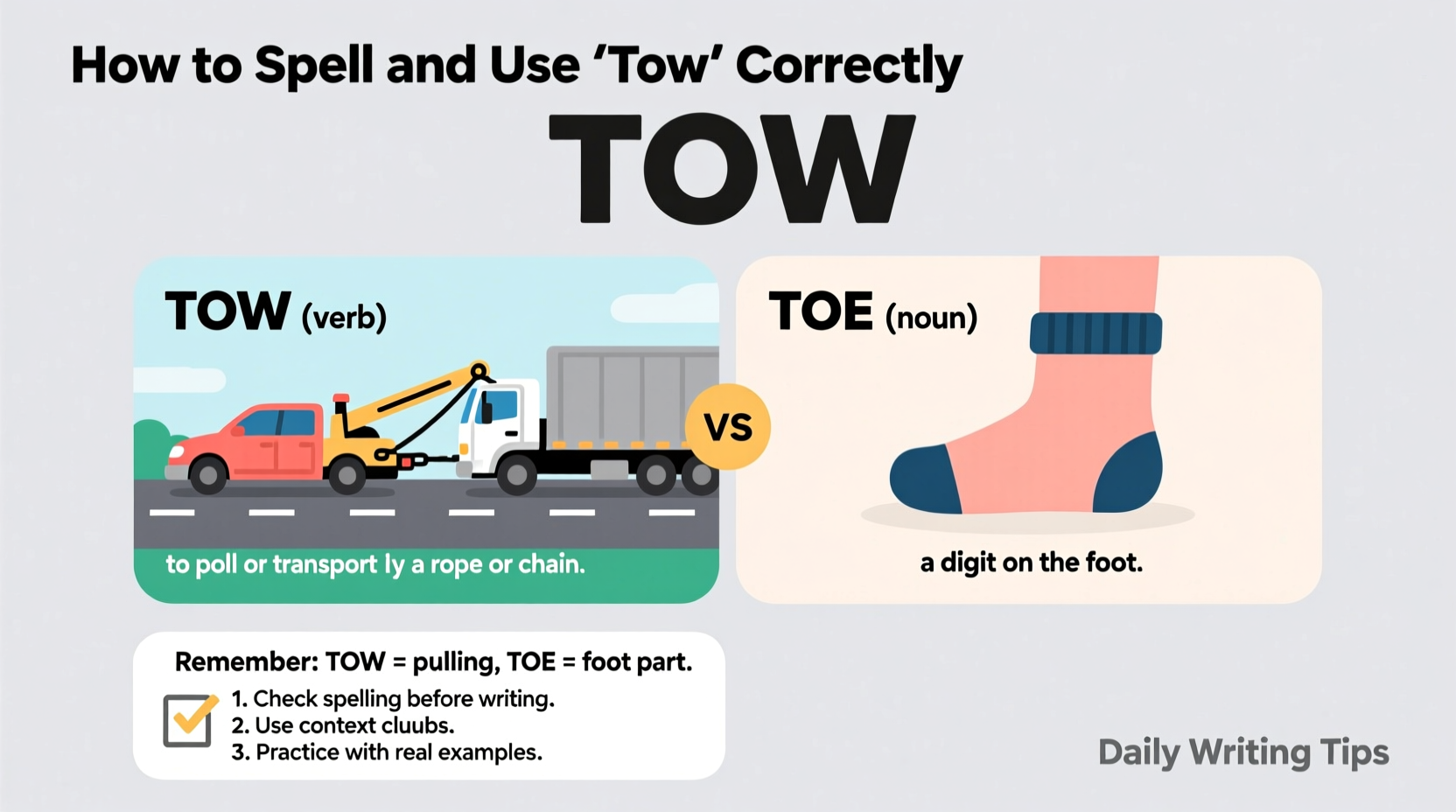The word \"tow\" is short, simple, and commonly used — yet it’s frequently misspelled or misused in casual writing. Whether you're drafting an email, filling out a form, or describing a roadside incident, understanding how to spell and use \"tow\" accurately ensures your message remains professional and clear. This guide breaks down the correct spelling, definitions, grammatical roles, and real-world applications of \"tow\" so you can use it confidently in any context.
Understanding the Correct Spelling of \"Tow\"

The correct spelling is t-o-w. It is a one-syllable word pronounced /toʊ/. Despite its simplicity, people often confuse it with similar-sounding words like \"to,\" \"too,\" or even \"two.\" These homophones share pronunciation but differ in meaning and function.
\"Tow\" is never spelled as \"to,\" \"too,\" or \"two.\" Each of these serves a different purpose:
- To: preposition indicating direction or part of an infinitive verb (e.g., \"go to school,\" \"to run\")
- Too: means \"also\" or \"excessively\" (e.g., \"I want to go too,\" \"It's too cold\")
- Two: the number 2
- Tow: refers to pulling something behind, especially a vehicle
Different Meanings and Uses of \"Tow\"
\"Tow\" functions as both a noun and a verb, depending on the sentence structure. Understanding these roles helps prevent misuse.
As a Verb: To Pull Behind
When used as a verb, \"to tow\" means to pull something, typically a disabled vehicle, using a rope, chain, or specialized equipment.
“After the engine failed, the driver called for a truck to tow the car to the nearest garage.”
This usage applies not only to vehicles but also to boats, trailers, or heavy machinery. The verb can appear in various tenses:
- Present: \"The service will tow your vehicle.\"
- Past: \"They towed the van from the accident site.\"
- Future: \"We’ll need to tow it tomorrow if the rain doesn’t stop.\"
As a Noun: The Act or Result of Pulling
As a noun, \"a tow\" refers to the act of being pulled or the service provided.
“She received a free tow after signing up for roadside assistance.”
You might hear phrases like \"need a tow,\" \"get a tow,\" or \"call for a tow\" — all referring to the service of vehicle recovery.
Other Contexts: Towels and Towing Capacity
A common confusion arises between \"tow\" and \"towel.\" Though they sound similar, they are unrelated. A \"towel\" is a piece of absorbent fabric; \"tow\" has no connection to drying or textiles. However, historically, \"tow\" referred to coarse fibers from flax or hemp — a lesser-known definition that rarely appears in modern conversation.
In automotive discussions, \"towing capacity\" is a standard term indicating how much weight a vehicle can safely pull. This technical use reinforces the importance of correct spelling in manuals, advertisements, and safety documentation.
Common Mistakes and How to Avoid Them
Mistakes involving \"tow\" usually stem from phonetic confusion rather than ignorance of the word itself. Below is a summary of typical errors and corrections.
| Incorrect | Correct | Explanation |
|---|---|---|
| I got my car taken to the shop. | I had my car towed to the shop. | \"To\" does not convey pulling; use \"towed\" for clarity. |
| The truck was stuck and needed too. | The truck was stuck and needed a tow. | \"Too\" means \"also\" — incorrect here. |
| We used a two-line system. | We used a tow line system. | \"Two\" is the number; \"tow\" describes function. |
| Can you too me home? | Can you tow me home? | Grammatical and semantic error; must use \"tow\" as verb. |
Real-Life Example: A Miscommunication at the Gas Station
At a rural gas station in Indiana, a driver wrote a note asking for help: “My car broke down, please send someone to take it to the mechanic.” The attendant assumed the driver wanted a ride, not vehicle recovery. After clarification, the driver corrected the message: “Please have my car towed to Johnson’s Auto Repair.”
This small change eliminated ambiguity. The revised sentence clearly indicated mechanical assistance rather than transportation. It illustrates how precise language prevents delays and misunderstandings — especially in urgent situations where time matters.
Step-by-Step Guide to Using \"Tow\" Correctly
Follow this five-step process to ensure accurate usage every time:
- Identify the action: Determine whether something is being pulled physically.
- Choose the right form: Use \"tow\" as a verb (\"will tow\"), \"towed\" as past tense, or \"a tow\" as a noun.
- Check for homophones: Eliminate \"to,\" \"too,\" and \"two\" unless they serve their specific grammatical roles.
- Review context: In technical or formal writing, confirm that \"tow\" aligns with industry terms like \"towing service\" or \"tow truck.\"
- Edit aloud: Read the sentence to catch awkward phrasing or incorrect word choices.
“Precision in language reduces risk, especially in emergency communications.” — Dr. Linda Reeves, Linguistics Professor, University of Colorado
Quick Checklist for Everyday Writing
Before sending emails, posting online, or completing forms, run through this checklist:
- ✅ Did I mean “pull” when I wrote “tow”?
- ✅ Is “tow” spelled t-o-w?
- ✅ Have I avoided confusing it with “to,” “too,” or “two”?
- ✅ Does the verb agree with the subject (e.g., “They towed,” not “They toweded”)?
- ✅ In formal contexts, is “towing” used appropriately (e.g., “towing policy,” “tow zone”)?
Frequently Asked Questions
Is \"tow\" ever spelled differently in British or American English?
No. \"Tow\" is spelled the same way in both British and American English. Unlike words such as \"color/colour,\" there is no regional variation in spelling.
Can \"tow\" be used metaphorically?
Rarely. While some creative writers may use \"tow\" figuratively (e.g., “towing memories”), it is generally reserved for literal physical pulling. In most cases, clearer alternatives exist for abstract ideas.
What’s the difference between “tow truck” and “tow vehicle”?
A “tow truck” is a specialized vehicle designed to recover others. “Tow vehicle” usually refers to a car or truck capable of pulling a trailer. Context determines which term fits best.
Final Thoughts and Call to Action
Mastering the correct spelling and usage of \"tow\" may seem minor, but it reflects attention to detail and clarity in communication. Whether you're reporting a breakdown, writing instructions, or describing logistics, using \"tow\" accurately strengthens your credibility and prevents confusion.
Language evolves, but precision remains essential. Take a moment to review your recent messages — did you use \"tow\" correctly? Share this guide with colleagues, friends, or family who might benefit from clearer writing. And next time you see a tow truck on the highway, remember: a single letter makes all the difference.









 浙公网安备
33010002000092号
浙公网安备
33010002000092号 浙B2-20120091-4
浙B2-20120091-4
Comments
No comments yet. Why don't you start the discussion?